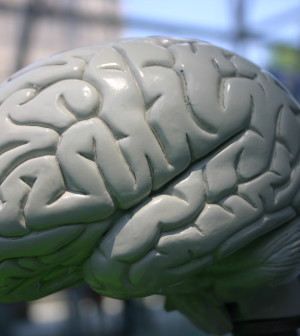- Could Your Grocery Store Meat Be Causing Recurring UTIs?
- Are You Making This Expensive Thermostat Error This Winter?
- Recognizing the Signs of Hypothyroidism
- 10 Strategies to Overcome Insomnia
- Could Artificial Sweeteners Be Aging the Brain Faster?
- Techniques for Soothing Your Nervous System
- Does the Water in Your House Smell Funny? Here’s Why
- Can a Daily Dose of Apple Cider Vinegar Actually Aid Weight Loss?
- 6 Health Beverages That Can Actually Spike Your Blood Sugar
- Treatment Options for Social Anxiety Disorder
Mistakes During Delivery Rarely Cause Newborn Brain Damage, Study Contends

Few cases of severe brain damage in newborns are due to mistakes made during delivery, a new, small study indicates.
Researchers analyzed the medical records of 32 full-term infants with cerebral palsy and mental retardation, and found that the brain damage that caused the conditions occurred after birth and despite proper resuscitation.
The cases examined included 18 newborns with an infection called chorioamnionitis, and 14 newborns with severe anemia. Chorioamnionitis is a bacterial infection in the membranes that surround the fetus and in the amniotic fluid. In anemia, there is an insufficient amount of blood in the baby after birth.
“All too often in cases of professional liability, the focus is on the last two hours of a normal 7,000-hour term pregnancy,” study author Dr. Jonathan Muraskas and colleagues wrote.
“This study would support closer scrutiny of the first two hours [following birth] as a possible [cause] for non-preventable adverse neurological outcomes in newborns,” the authors added.
Muraskas is co-medical director of the neonatal intensive care unit at Loyola University Medical Center in Chicago. He is also a professor in the department of pediatrics of Loyola University Chicago Stritch School of Medicine.
For the study, Muraskas and his colleagues examined the babies’ medical records and found indicators suggesting that they had not suffered brain damage before birth.
But after they were born, the babies’ brains were affected by their infections or anemia, the findings suggested. Severe cases of chorioamnionitis and anemia can prevent oxygen from being delivered to the brain and other vital organs, Muraskas explained in a Loyola news release.
Between one and three of every 1,000 full-term newborns has brain damage. Only 8 percent to 14.5 percent of such cases are caused by inadequate blood supply to the brain during delivery, but these cases are the leading cause of allegations of mismanagement by obstetricians during delivery, according to the researchers.
The study was published Jan. 21 in the Journal of Perinatology.
More information
The U.S. Centers for Disease Control and Prevention has more about cerebral palsy.
Source: HealthDay
Copyright © 2026 HealthDay. All rights reserved.










